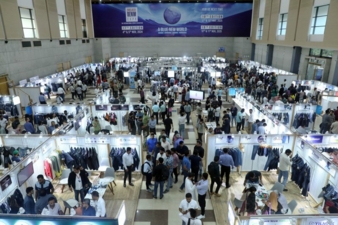20.11.24 – Trade fairs
17th Bangladesh Denim Expo after event
Over 5543 visitors from 56 countries joined the 17th edition of Bangladesh Denim Expo held from November 4th–5th, 2024 in Dhaka. The trade fair has shown how ethical responsibility and transparency can drive innovation for a new start.
The 17th edition of the Bangladesh Denim Expo was successfully completed at the International Convention City, Bashundhara (ICCB), Dhaka, Bangladesh. The two-day, Bangladesh Denim Expo was organized by Bangladesh Apparel Exchange, where over 45 exhibitors from 7 countries showcased their latest denim products, fabrics, accessories, chemicals, technologies etc. The theme of the 17th edition was “A Blue New World.”
The Expo embraced a new beginning in the fashion industry with the dedication to eco-friendly practices and responsible sourcing. This journey highlights the critical role of innovation and sustainability, particularly in Bangladesh, where ethical responsibility and quality coexist. Moreover, the two-day event was a remarkable journey of knowledge and inspiration. There were two dynamic panel discussions with the following topics:
Panel discussion 1: what steps must Bangladesh take to lead the Global Apparel Industry by 2030?
This session explored the strategic actions required for Bangladesh’s RMG sector to transition from a low-cost production hub to a global leader in high-value, sustainable apparel by 2030.
Panel discussions 2: shaping RMG sector in future: GSP+ and LDC Transition
This session addressed the critical issues surrounding Bangladesh’s transition from LDC status by 2029 and the need to secure GSP+ eligibility to maintain market access. Distinguished speakers of this panel discussion 2 was M Riaz Hamidullah (Moderator), Additional Foreign Secretary (Multilateral and Regional), Ministry of Foreign Affairs, Government of the People's Republic of Bangladesh said “Many people believe that Bangladesh would be able to meet all of the expectations. But there are a lot of challenges. I think at the end, liberty, inclusion, and transparency will be the key. Labour rights are also a value proposition.”
Further opinions:
Ole Rosenborg Justesen, Sector Counsellor, Embassy of Denmark in Bangladesh, said “I would focus on 3 areas in terms of working with Bangladesh. They are labour rights, labour law and inspection, and investments in the supply chain. Labour inspection is absolutely crucial in terms of improving the working conditions of factories. We have to talk about investments in whole infrastructures. Instead of seeing due diligence as a hindrance i would suggest considering it as a competitiveness.”
Professor Mustafizur Rahman, Distinguished Fellow, Centre for Policy Dialogue (CPD), said “I’m very hopeful that the success story of the Bangladeshi RMG industry will continue. Bangladesh is very poised for LDC graduation. I think we will have to restructure the incentives in terms of the challenges that are coming. My proposition will be that brands and buyers will have to help our entrepreneurs in terms of technology transfer, labour compliance, and other standards.“
Shah Rayeed Chowdhury, Director, Evince Group, said “One of the key things is not to forget the basics of our business: relationship with the buyers. We are investing in automation. The man behind the machine is more important. That is why we’re investing a lot in team building. We’re trying to think of automation differently to remain competitive in the long run. Compliance is a mandatory mindset.”
Ziaur Rahman, Regional Country Manager, Production (Bangladesh, Pakistan & Ethiopia), H&M, said “This industry is a four-decade-old industry. Our supply chain is much behind in terms of labour law. The awareness level is much less than what it's supposed to be. In terms of due diligence law, many suppliers are not fully aware of it and what areas they need to comply with. I think we have the basic recipe, and we need to start from there.”


